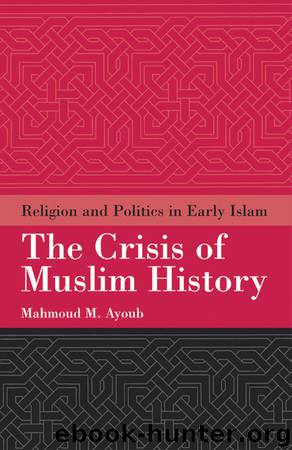The Crisis of Muslim History by Ayoub Mahmoud;

Author:Ayoub, Mahmoud;
Language: eng
Format: epub
Publisher: Oneworld Publications
Mu‘āwiyah’s Opposition
The conflict between ‘Alī and Mu‘āwiyah rested on ‘Alī’s conviction of the unquestionable legitimacy of his caliphal authority and on Mu‘āwiyah’s increasing insistence on his own right to be heir (walī) to ‘Uthmān in demanding retaliation for his blood. This claim, moreover, became the basis of Mu‘āwiyah’s bid for the caliphate. Ibn Qutaybah reports that Mu‘āwiyah received the allegiance of the people of Syria as ‘Uthmān’s successor soon after ‘Alī had assumed the caliphal office.31
The points of contention are clearly set forth in a long letter written by ‘Alī to Mu‘āwiyah, as reported by Naṣr b. Muzāḥim (d. 213/828) one of the earliest historians of the civil war of Ṣiffīn. ‘Alī argued:
My bay‘ah from the people of Madīnah is binding upon you even though you are in Syria. This is because they are the people who gave the same oath of allegiance to Abū Bakr, ‘Umar and ‘Uthmān. Thus, others who were present had no choice in the matter, and those who were far away have no right to object, for the prerogative of consultation (shūrā) belongs only to the Muhājirūn and Anṣār. Once they have agreed on a man as the imām and declared him by name, their decision must be accepted. If, moreover, anyone deviates from their decision either by denouncing it or coveting [the caliphate for himself], they must bring him back. If he resists, they must fight him, for he will not have followed the way of the people of faith.
‘Alī then recounted the fate that had befallen Ṭalḥah and al-Zubayr after they revoked their bay‘ah. Turning next to the question of avenging ‘Uthmān, ‘Alī counseled Mu‘āwiyah to join the Muslims in their pledge of fealty and promised to judge the murderers in accordance with the Book of God. “As for your desire for the caliphate,” ‘Alī continued, “it is like the deception of an infant away from its mother’s milk. For, if you were to view this matter with your reason rather than your vain desire, you would find me the most innocent man of the Quraysh of the blood of ‘Uthmān.” ‘Alī concluded with the reminder that Mu‘āwiyah had been among those pardoned by the Prophet on the day of the conquest of Makkah and thus had no legitimate claim to the caliphate.32
It was observed above that a primary cause for the insurrection of Ṭalḥah and al-Zubayr was their desire for wealth and prestige. We also saw that ‘Alī was uncompromising in his refusal to grant favors, either to buy loyalty or to mollify opposition. This clash between religious fundamentals and political or social expediency is graphically portrayed in two anecdotes. The first is a brief exchange between ‘Alī and his nephew ‘Abd Allāh b. Ja‘far b. Abī Ṭālib. ‘Abd Allāh asked for financial help from the central treasury, for he was forced to sell the fodder of his animals to feed his children. ‘Alī replied, “No by God, I have nothing for you, unless you command your uncle to steal and give to you.
Download
This site does not store any files on its server. We only index and link to content provided by other sites. Please contact the content providers to delete copyright contents if any and email us, we'll remove relevant links or contents immediately.
The History of Jihad: From Muhammad to ISIS by Spencer Robert(2505)
Nine Parts of Desire by Geraldine Brooks(2279)
The Turkish Psychedelic Explosion by Daniel Spicer(2245)
The First Muslim The Story of Muhammad by Lesley Hazleton(2154)
The Essential Rumi by Coleman Barks(1927)
1453 by Roger Crowley(1880)
The Last Mughal by William Dalrymple(1787)
Trickster Travels: A Sixteenth-Century Muslim Between Worlds by Davis Natalie Zemon(1783)
Muhammad: His Life Based on the Earliest Sources by Martin Lings(1567)
by Christianity & Islam(1561)
God by Aslan Reza(1555)
A Concise History of Sunnis and Shi'is by John McHugo(1507)
Magic and Divination in Early Islam by Emilie Savage-Smith;(1450)
No God But God by Reza Aslan(1434)
The Flight of the Intellectuals by Berman Paul(1393)
Art of Betrayal by Gordon Corera(1362)
Nothing to Envy by Barbara Demick(1323)
What the Qur'an Meant by Garry Wills(1318)
Getting Jesus Right: How Muslims Get Jesus and Islam Wrong by James A Beverley & Craig A Evans(1271)
